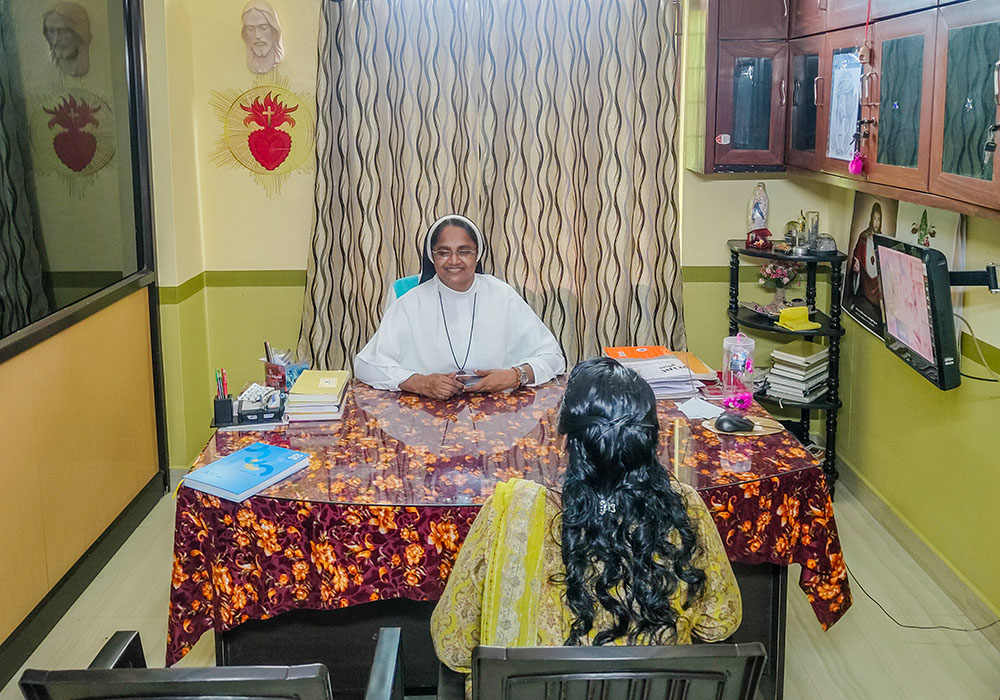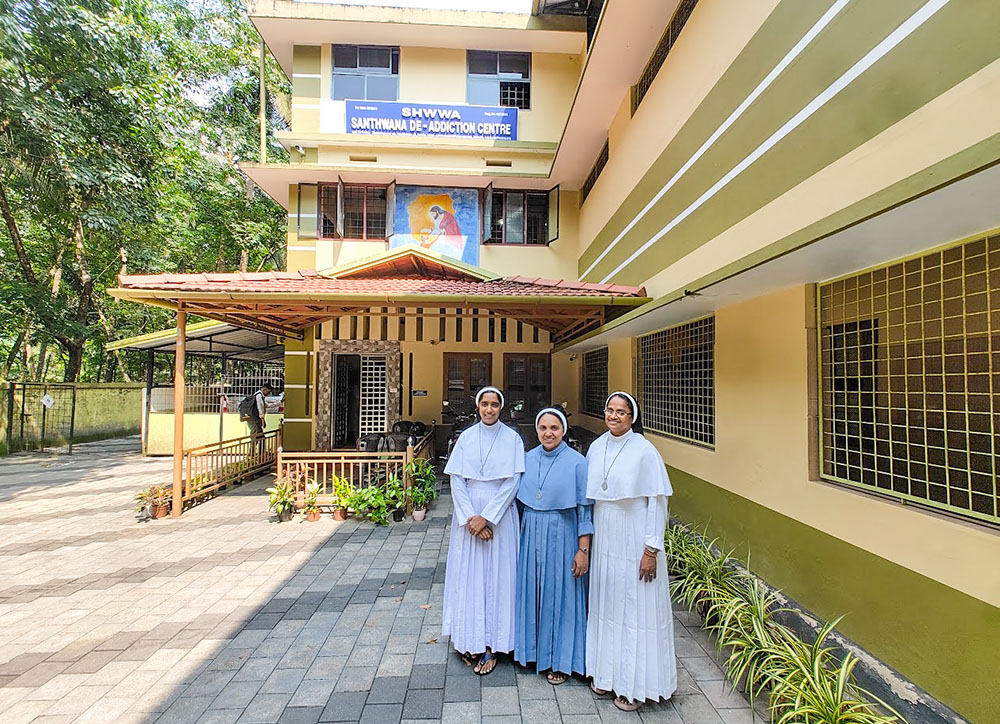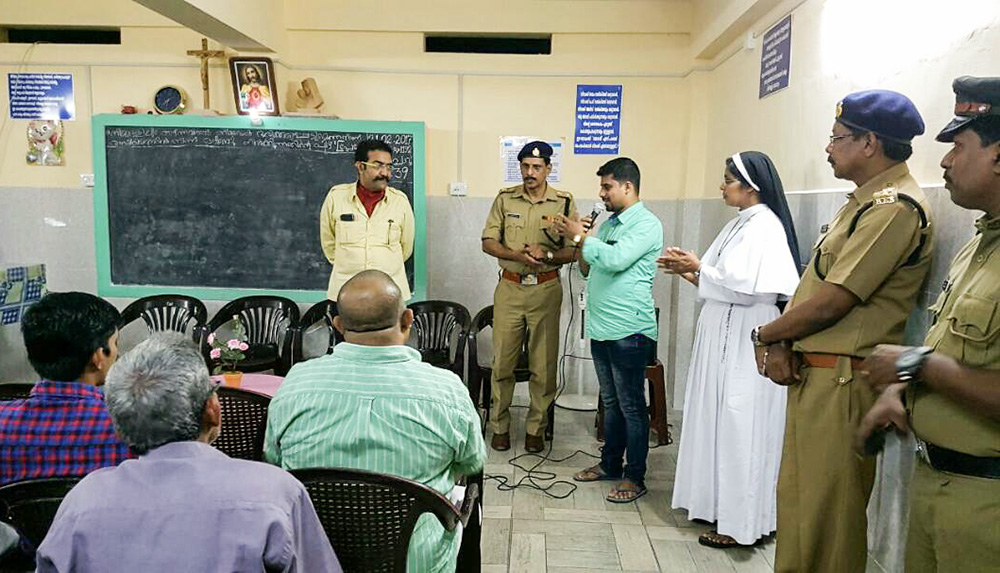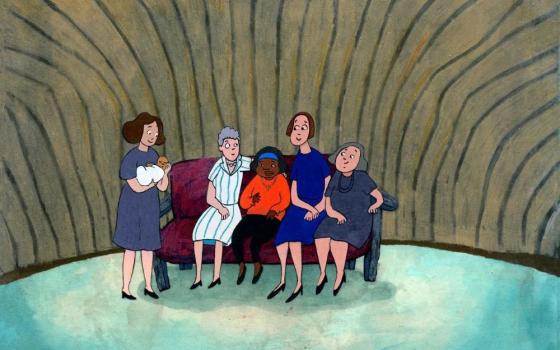
Sacred Heart Sr. Deepthi Maria at her office in the Santhwana De-addiction Centre at Kattippara in Kozhikode district, Kerala, southwestern India (George Kommattam)
Leela Shaji led a life of fear and insecurity for 20 years until a Sacred Heart sister brought her alcoholic husband to the Santhwana De-Addiction Centre in the southwestern Indian state of Kerala.
Eight years later, her husband, Shaji Thundassery, credits the Sacred Heart sisters at the center with his new life.
"The sisters didn't accuse me or judge me. They treated me like their brother. They helped me rediscover my life," the 55-year-old Catholic told Global Sisters Report in early April.
He said he resented coming to the center. "I didn't want to quit. I was not aware of my problem then," he said. "But my wife insisted. She and the sister from our parish dragged me here."
A relieved Shaji said she has peace now. "He used to come home drunk and create problems," she recalled.
Thundassery, who took to drinking at the age of 13 with his father, said his daughter would hide under the bed when he came home drunk.
"If the sisters had not taken me in, I would have committed suicide or died in an accident," he said.
Thundassery is among more than 9,000 alcoholics and drug addicts who started a new life at Santhwana, according to the center's records. The 50-bed center was founded in 2007 at Kattippara village, about 40 miles northeast of Kozhikode city, Kerala, southwestern India.

Sacred Heart sisters in front of the Santhwana De-addiction Centre at Kattippara in Kozhikode, Kerala, southwestern India. From left: Srs. Ann Tresa, Vimala Jose and Deepthi Maria. (George Kommattam)
"Alcoholism is a disease," said Sr. Deepthi Maria, the center's director for the past three years. "Most alcoholics don't realize the damage they're doing to themselves and their families. Our role is to help them become conscious of their actions."
The center offers a 23-day residential program that combines medical detoxification, psychological counseling and spiritual formation. The program includes individual and family counseling, group therapy, spiritual direction, community activities, gardening and games.
"We want them to feel human again," said Sr. Vimala Jose, a former director of the center and a team member.
Maria said alcoholism affects spiritual, mental, emotional, physical, social and familial life. "We help them regain this through classes, prayer, reading, communion and, above all, love," she said.
The center is managed by 16 staff and three nuns. The staff includes psychiatrists, psychologists, physicians and trained counselors. Patients are asked to contribute 22,000 rupees (about US$260) for the 23-day residential package. Once admitted, they begin detoxification, which takes a few days.
"After that, we help them understand their condition," said Maria, who worked as a nurse before working at the center.
Advertisement
"There is no direct medicine for alcoholism," she said, adding that treatment is only offered after a thorough checkup for any other health issues.
Sr. Ann Tresa stressed the importance of privacy during treatment. "We keep the identity of the patients highly confidential and never allow anyone to meet them during this period."
In addition to structured therapy, the nuns integrate spiritual teachings from the Bible, Quran and Bhagavad Gita. "All kinds of people come here — Hindus, Muslims [and] Christians," said Maria. "In fact, we have fewer Christians compared to other [religions]."
The center organizes a weekly Alcoholics Anonymous meeting that uses a 12-step program, and monthly family gatherings to help reinforce progress. The global fellowship of patients supports each other to achieve and maintain sobriety from alcohol through shared experiences.
"Every Thursday, we have group sessions, and on the third Saturday of each month, we bring families together to see the joy of change," Maria said. If needed, they also offer family counseling.
Vipin Varghese Valuplackal, a psychiatric social worker and counselor who has served at Santhwana for 11 years, said he believes in the healing power of dignity.
"Alcohol addicts are good people," he told GSR. "They are just unable to control themselves. We help them become aware of what they are doing."
Santhwana founder Sr. Elseena John said the center started after her provincial asked her to do something for the poor.

Rishiraj Singh (in yellow shirt), former excise commissioner of Kerala, visits the Santhwana De-addiction Centre at Kattippara in Kozhikode district, Kerala, southwestern India. (Courtesy of Deepthi Maria)
The nun, who had earlier served at an addiction center in the Tellicherry Archdiocese, said she has witnessed alcoholics overcoming their addiction after treatment.
"When [an] alcoholic changes, [the] entire family also transforms," she told GSR on April 8.
Her first challenge was that the center initially had no patients. After a few months, two people came to the center.
Another persistent challenge was finding funds.
"But with time, we overcame all the problems," said John.
Sunny Parayankuzhiyil, a rubber tapper, thanked the nuns for keeping him on track even after he completed treatment and left the center.
"After the treatment, they didn't leave me. They call me now and then and send messages," said the man, who started drinking when he was 17.
His children brought him to Santhwana after he became a problem in the family and neighborhood.
"I used to spend my earnings on alcohol. I wanted to quit when I saw my children's faces in the morning. In the evening, I ended up in the same condition," he told GSR.
A former patient says he still gets the urge to drink, but then 'remembers the sisters who taught me that love is the only medicine for alcoholism. Their sacrifice is real. I don't want to disappoint them.'
To foster a bond among their former patients, the nuns maintain a WhatsApp group that helps them stay connected and accountable. "Otherwise, they may slip back," said Valuplackal. "We call them, message them or visit when needed."
Parayankuzhiyil said they look out for each other. "If someone relapses, we go bring him back," he added.
Relatives brought a depressed Sajeesh K. Karat, a Hindu and area sales manager of a pharmaceutical firm, to Santhwana in 2021.
"I couldn't eat, sleep or control my thoughts. I never thought it was a disease until I came here," the 42-year-old told GSR.
He still gets the urge to drink, but then "remembers the sisters who taught me that love is the only medicine for alcoholism. Their sacrifice is real. I don't want to disappoint them."
Some come to Santhwana on their own, such as T.C. Binesh, a Hindu, who found the center after an internet search. "In February 2021, I walked out of the gates, leaving behind my long struggle with alcoholism," said the 39-year-old hotel manager.
He told GSR that he was fortunate to "end up at the best place. It's not just their classes that make the difference, but their follow-up care," he added.
Amal Vaippukkattil, a psychology student at Lisie College of Nursing in Puthuppady who completed his project at Santhwana, is also impressed.
"These sisters are angels. They are doing great work. They bring peace and happiness to families torn apart by alcoholism," he told GSR.





